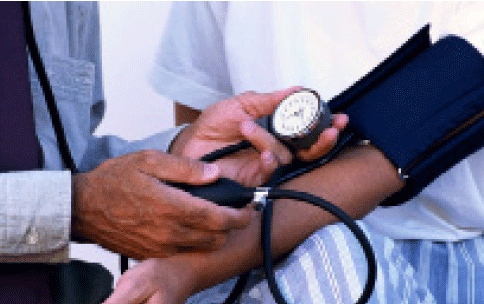Health experts are worried that the problems caused by hypertension are worsened by the fact that most Nigerians are either not aware of the necessity for regular blood pressure checks, which is why reason there is a continued rise in challenges posed by this silent killer, writes Woman Editor, TEMITOPE DAVID-ADEGBOYE
Nigeria is one of the many developing countries where healthcare services are focused more on infectious diseases such as malaria, human immunodeficiency virus (HIV) and polio. However, in recent years, non-communicable diseases, such as hypertension, cancer, diabetes and stroke are becoming an increasing problem.
Health experts, especially cardiologists, have continued to warn that the harder the heart pumps and the narrower the arteries are, the higher your blood pressure (BP). Over time, the wear and tear caused by untreated high BP can damage blood vessels and vital organs such as the heart and arteries. They also warn that unnecessary agitations could lead to build-up of damage to these vital organs.
This condition is aggravated by the everyday hustle and bustle of life as experienced by almost all in cities and towns across the country, with many struggling to meet their day-to-day demands.
High BP, commonly known as hypertension, is responsible for an estimated 45 percent of deaths due to heart disease and 51percent of deaths due to stroke.
The prevalence of hypertension varies around the world with the lowest prevalence in rural India (3.4 percent in men and 6.8 percent in women) and the highest prevalence in Poland (68.9 percent in men and 72.5 percent in women).
According to the World Health Organisation (WHO), Africa has the highest prevalence of hypertension estimated at 46 percent of adults aged 25 and above.
In Nigeria, the picture is particularly worrisome. A recent community-based study of rural and semi-urban population in Enugu, Nigeria, put the prevalence of hypertension in Nigeria at 32.8 per cent, while a Meta analytical study estimated the countrywide prevalence to be between 12.4 percent and 34.8 percent. The disturbing reality of this statistics is that between a staggering 20.088 million and 56.376 million Nigerian citizens are hypertensive.
More worrisome is that hypertension, which hitherto was associated with older people, especially above 60 years of age, is now a common ailment among people less than 40.
Fortunately, BP is easily measured with a simple, non-invasive test. Once you know you have volatileBP, lifestyle changes (like eating habit and regular exercise) and BP-lowering medication should be part of you.
Unfortunately, in Nigeria, the problems caused by hypertension are worsened by the fact that most Nigerians are either not aware of the necessity for regular BP checks, or are unable to afford the checks, says Dr. Olushola Osho, the Chief Consultant Cardiologist in a private hospital in Ikoyi, Lagos.
“High blood pressure can be in people without any symptoms in the person; they won’t feel anything, just feel well. And the first time the person knows that anything is wrong is that they are probably dead or they have suffered a massive heart attack from which they may survive and subsequently do very badly. Or suddenly suffer a very big stroke from which they don’t recover or they recover badly or they suddenly find themselves with kidney failure. That is why it is called the ‘silent killer’,” he warned.
To tackle the challenges posed by this condition and its complications, he called for improved awareness on the causes and consequences.
Dr. Osho also urged Nigerians who are in the habit of ignoring their health status and allowing their condition to worsen, thus becoming injurious, to desist from it.
“It is sensible to know that some of these conditions, particularly the cardiovascular ones, will not tell you anything. They are also present in a very similar way to any other medical condition like malaria, body aches and pains, headaches, which people dismiss very easily. Or quickly take one or two tablets and they may get a respite and think that is the end.
“People should endeavour to go for regular medical check-up to be able to detect illnesses early enough.
“Regular exercise and healthy dieting has the capacity to promote the health of the heart and blood vessels.
“Almonds, whole grains, fish rich in Omega-3 as well as fruits and vegetables contain dietary nutrients with the capacity to boost the wellbeing of the heart,” Osho said.
On his part, Prof. Peter Okokhere, a cardiologist, said: “This worsening trend may be attributed to the adoption of western lifestyle by Nigerians over the years.
“Many studies have conclusively revealed that some lifestyles contribute to the incidence and severity of hypertension.
“Environmental factors, such as calorie intake, salt intake, alcohol consumption, physical exercise and rural-urban migration interact with genetic factors to cause hypertension.
“There should be a deliberate effort at promoting healthy lifestyles in the populace. This should come in the form of modifying designs of residential estates to create walkways, bicycle tracks and neighbourhood centres with recreation facilities. Government must do more to increase Universal Health Coverage for Nigerians.”
Because hypertension management depends mainly on accurate measurement of BP, efforts should be made to sanitise the medical/BP equipment supplies and marketing sector.
There have been reports of more fake BP meters (sphygmomanometer)in the market than the genuine. Readings from these malfunctioning equipment have misled not a few with dire consequences. Also, local drug and medical equipment manufacturing should be encouraged to help reduce cost of anti-hypertensive drugs.
As Nigeria joins the rest of the world to mark this year’s World Health Day, on April 7, the general opinion is that there is the need for more awareness of the causes and consequences of hypertension, as well as how it can be prevented, and to encourage national and local authorities to do more about this growing problem.














